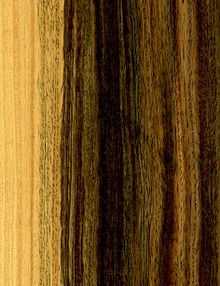Bulnesia sarmientoi
| Bulnesia sarmientoi | |
|---|---|
| Conservation status | |
| Scientific classification | |
| Kingdom: | Plantae |
| (unranked): | Angiosperms |
| (unranked): | Eudicots |
| (unranked): | Rosids |
| Order: | Zygophyllales |
| Family: | Zygophyllaceae |
| Genus: | Bulnesia |
| Species: | B. sarmientoi |
| Binomial name | |
| Bulnesia sarmientoi Lorentz ex Griseb. | |

Bulnesia sarmientoi is a tree that inhabits a part of the Gran Chaco area in South America, around the Argentina-Bolivia-Paraguay border. Its wood is often traded as Argentine lignum vitae or Paraguay lignum vitae, since it has properties and uses similar to the "true" lignum vitae trees of genus Guaiacum, which are close relatives. Another trade name is "vera" or "verawood", which may also refer to the even more closely related B. arborea. Another common but rather ambiguous name is "palo santo" (Spanish: "holy wood"). In some places it is called ibiocaí
Bulnesia sarmientoi heartwood is brown, black, and green (varying in color from light olive green to chocolate brown), with streaks. The sapwood is mostly thin and light yellow. The basic specific gravity of this wood is between 0.92 and 1.1 g/cm³.
Palo santo is employed for engraving work and for the making of durable wooden posts. From its wood, also, a type of oil known as oil of guaiac (or guayacol) is produced, to be used as an ingredient for perfumes. Its resin can be obtained by means of organic solvents, and is employed to make varnishes and dark paints.
Palo santo is appreciated for the skin-healing properties of its essence and also because it provides good charcoal and a high quality timber. It ignites easily despite being so dense, and produces a fragrant smoke. Natives of the Chaco region employ the bark to treat stomach problems. Small pieces of the wood are also used as a form of natural incense in spiritual rituals.
References
| Wikimedia Commons has media related to Bulnesia sarmientoi. |
- World Conservation Monitoring Centre. 1998. Bulnesia sarmientoi. In: IUCN 2013. IUCN Red List of Threatened Species. Version 2013.1. Downloaded on 5 August 2013.
- Richter, H. G. and M. J. Dallwitz. Commercial timbers.
- Catálogo Web de especies forestales - Facultad de Ciencias Agrarias, Universidad Nacional de Asunción (in Spanish)
- Bilger, Burkhard (2008-11-24), "A Better Brew", The New Yorker, retrieved 2009-07-12,
Gasparine, by then, had begun to have second thoughts. No lumbermill he knew had ever cut so much palo santo, and he wasn't sure that any could. Bulnesia sarmientoi is a weedy, willowy tree, sometimes called ironwood." … "The barrel that Dogfish built is now housed at its main brewery, in Milton, Delaware. It's fifteen feet high and ten feet in diameter, and holds nine thousand gallons.
